

We Are All Liminal Still. One year on, and we are all still in between.
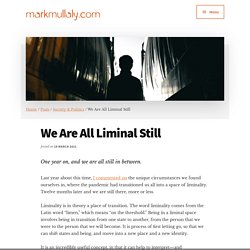
Last year about this time, I commented on the unique circumstances we found ourselves in, where the pandemic had transitioned us all into a space of liminality. Twelve months later and we are still there, more or less. Liminality is in theory a place of transition. The word liminality comes from the Latin word “limen,” which means “on the threshold.” Being in a liminal space involves being in transition from one state to another, from the person that we were to the person that we will become. It is an incredibly useful concept, in that it can help to interpret—and navigate—any number of transitions. What was unique about the start of the pandemic was that we transitioned into the same liminal situation at the exact same time. 5 Ways Nonprofits Are Growing Change Muscle Today. Like many organizations, nonprofits struggle with how to support their people through new ways of working.
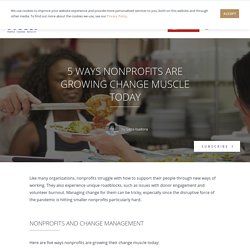
They also experience unique roadblocks, such as issues with donor engagement and volunteer burnout. Managing change for them can be tricky, especially since the disruptive force of the pandemic is hitting smaller nonprofits particularly hard. Nonprofits and Change Management Here are five ways nonprofits are growing their change muscle today: 1. The transition to virtual services during the pandemic created anxiety for many nonprofits, including Austin-based Broadcast Your Love (BYL). Prosci’s ADKAR Model helped address the barrier points BYL leaders and instructors faced as they looked at ways the organization could adjust to change.
Change Management: Agile Imperatives for the Post-COVID Era. To keep up in the post-COVID era, organizations will need to focus on change management, agile business processes, and innovation.
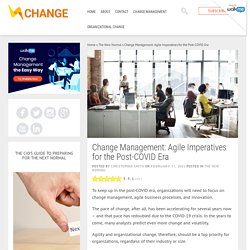
The pace of change, after all, has been accelerating for several years now – and that pace has redoubled due to the COVID-19 crisis. In the years to come, many analysts predict even more change and volatility. Agility and organizational change, therefore, should be a top priority for organizations, regardless of their industry or size. Below, we’ll look at the factors driving economic volatility, then explore several actions that businesses should take to keep up. Change Management: Agile Imperatives for the Post-COVID Era The post-COVID world will be so different from the pre-2020 era that some suggest we are entering a “new normal,” or, as McKinsey calls it, “the next normal.”
Though the future is not yet written – and we cannot say for certain what tomorrow will bring – most research firms share many of the same predictions. Webinar Shorts: Adopt Social Distancing with the ADKAR Model. Communicating with Compassion in the COVID-19 World. Racing To The Covid19 Finish Line In Three Phases. Act I: Mastering "epinomics" Act One is about balancing epidemiology and socioeconomics (what we call “epinomics”).

An epinomic approach involves managing risk—and the recognition that we cannot eliminate it entirely. We need targeted public health measures that decrease risk with the lowest socioeconomic cost. For example, we know that schools are reasonably safe and extremely important. They should mostly be open. For this act to succeed, Congress must pass urgent fiscal stimulus support to give citizens the food, income, and employment security needed to make these measures bearable and compliance possible. The Ultimate Guide to Managing Change Post Covid.
Leading change as we know it will no longer be the same.
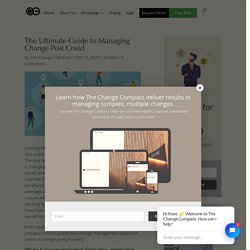
Our audience has changed. Our industries have changed. The way people work is changing. Biden’s Covid-19 Task Force Needs Behavioral Scientists. Stuck - Crises are the ideal time to make big changes to create a better future. So why aren't companies making them? The path to true transformation. Video McKinsey senior partner Harry Robinson joins CEOs to discuss what it takes to truly transform an organization.
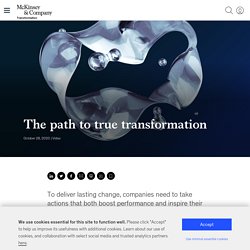
Special Report The next normal: Transformation with a capital T This collection is the second of five edited volumes to accompany our multimedia series, airing on CNBC, focusing on the forces shaping the next normal. Pandemic Accentuates Two Problems With Change Management: One Is Change, The Other Is Management. With the global pandemic forcing most institutions and individuals to change much of what they do, and how they do it, I’m reluctant to state the obvious: Things haven’t always gone well.
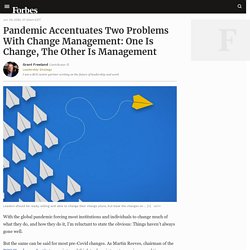
But the same can be said for most pre-Covid changes. As Martin Reeves, chairman of the BCG Henderson Institute, our internal think tank, points out, even in normal times, change is tough, with companies failing to meet expectations roughly 75% of the time. Why is change, even when your back isn’t up against the wall, so difficult? There probably are as many reasons as there are companies. But three of the biggest reasons are the following: Because companies frequently start their change efforts too late; they’re too rigid in their approach, and they ignore—or don’t even look for—available evidence on what’s working and what isn’t.
What percent of OCM professionals reported that their careers were negatively impacted by COVID-19? Unleashing sustainable speed in a post-COVID world: Reshape talent. September 28, 2020In parts one and two of this series on what organizations can learn from the pace at which many companies had to operate as the pandemic unfolded, we reviewed the first six actions that can help unleash sustainable speed.
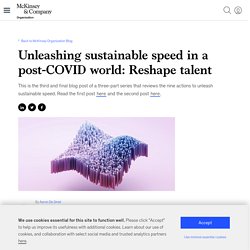
In this final post of the series, we address the last three actions—all aiming to reshape talent to get tomorrow’s leadership team operational today and to build the workforce capabilities of the future: 7. Field tomorrow’s leaders today: One of the unexpected consequences of the pandemic is that CEOs have seen into a window that shows who their future leaders are. They have seen who can make decisions and execute rapidly, who is able to take on new challenges and lead in the face of uncertainty, and who has the grit to persevere. Unleashing sustainable speed in a post-COVID world: Reimagine structure. September 21, 2020In the first blog post in this series, we discussed how many organizations were forced to accelerate numerous approaches to business (serving customers, working with vendors, collaborating with colleagues) due to the eruption of the coronavirus pandemic.
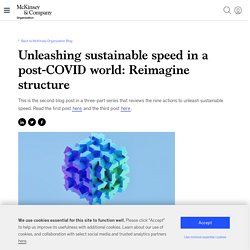
While many companies may have been uncomfortable with having to stretch extensively in such a short period of time, the results indicate that this faster, more agile way of working should become the new normal. Based on numerous case studies, we’ve uncovered nine actions that can help organizations unleash sustainable speed. The first three, covered in the first part of the series, aim to rethink ways of working: speed up and delegate decision making, step up execution excellence, and cultivate extraordinary partnerships.
In this blog post, we’re reviewing the next three actions—all of which aim to reimagine structure: 4. 5. 6. Unleashing sustainable speed in a post-COVID world: Rethink ways of working. September 8, 2020The pandemic has forced many businesses to navigate crisis conditions in new and unprecedented ways.
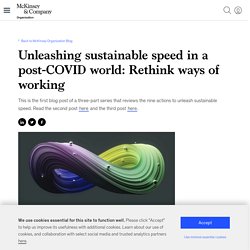
When COVID-19 erupted, many companies realized that business-as-usual approaches to serving customers, working with suppliers and collaborating with colleagues—or just getting anything done—would no longer work. They were forced to increase the speed at which they did everything, from decision-making and productivity to utilizing technology in new ways to accelerating innovation. The result? Organizations across a wide range of sectors achieved positive results in record time: A U.S. At the heart of these examples is speed.
CM is facing two new challenges due to Covid-19. Change Management practitioners have a lot on their plate. Why? Because we now face two new challenges due to Covid-19; ensuring a safe move to the “new normal” and changing how we do Change Management. Returning to the workplace (RTW) might feel like stepping into a new world. Changes will impact every aspect of our work, from how we collaborate to where we work, and how we are managed. CM is the key to making that happen. Addressing US behavioral health crisis during COVID-19. The COVID-19 outbreak is a human tragedy that affects not only the global economy but also the global psyche. In a recent publication, “Returning to resilience: The impact of COVID-19 on mental health and substance use,” we highlighted the potential behavioral health impact of the economic and emotional distress caused by the COVID-19 pandemic.
Now, we offer a deeper dive into four actions healthcare leaders can take to address behavioral health surrounding the COVID-19 pandemic: Strengthen community prevention Leverage data, analytics, and technology Integrate behavioral and physical health services Partner to address unmet health-related basic needs Behavioral health conditions, consisting of mental and substance use disorders, have societal, economic, and healthcare system implications, all of which are amplified by the COVID-19 pandemic. Healthcare leaders already face the challenge of meaningfully improving behavioral health, which may be exacerbated by COVID-19. Podcast: Understanding the Employee Experience PART 2 – Before, During, and After COVID-19.
Podcast: Change Scenarios – What Will the New Normal Look Like Post-Corona Crisis? – With Melanie Franklin. Podcast: Play in new window | Download Subscribe: Apple Podcasts | Android | In this episode of the Change Management Review™ Podcast, Theresa Moulton interviews Melanie Franklin, Co-Chair of the Change Management Institute UK, Director of Agile Change Management LTD, and a respected author of text books and articles on change, project, and program management. Melanie is also an examiner, responsible for assurance of the work of a team of examiners creating professional qualifications in Change Management. Melanie is highly respected in her field and is sought-out by many organizations all over the world who need support in creating their strategy and plans for managing change. In this session, Melanie will share some of the thinking she is developing on behalf of a number of organizations who are using these scenarios to update their strategic plans.
Questions Asked: How to deliver virtual Change Management to consulting clients in the ‘new normal’ What we initially thought back in March was a short-term halt to ‘business as usual’ has turned into a longer-term major disruption of the way we do business – and go about our lives in general. It is also looking likely to be 2021 before businesses get back to ‘normal’, Or at least some form of a ‘new normal’. As major economies enter recession as the impact of the pandemic bites, customers are likely to be very wary of spending money. Some organizations will also be re-starting themselves and supply chains will be disrupted. How organizations can build healthy employee habits. July 6, 2020The COVID-19 pandemic has accelerated many forces already in play over the last decade. One of the most significant shifts being the move to remote and distributed work.
In this context, a frequent question we hear from leaders is: How do we promote healthy and performance-driving habits across our front-line teams, many of whom are more decentralized than ever before? The good news is that there is no better time to build habits than during times of rapid change. Habits are automatic behaviors that occur in response to a recurring cue in the environment. Environmental cues are the key, but often an overlooked, component of habit formation. How habits work. Measuring Your Organization’s Ability To Change. Don’t Let the Pandemic Sink Your Company Culture. Driving organizational and behavior changes during a pandemic.
August 6, 2020In our previous post, we provided an overview of what companies are doing during the COVID pandemic to stabilize or even improve their organizational health. Use the ADKAR Model to Reinforce Handwashing Behaviors. Categories, Crossroads, Control, Connectedness, Continuity, and Change: A Metaphorical Exploration of COVID-19 (2020) Introduction The images of “going through rehab” and “being mugged” convey very different “ways of thinking” (Lakoff & Johnson, 1980).
COVID-19’s Uncomfortable Revelations About Agile and Sustainable Organizations in a VUCA World (2020) Organizations confronting the realities of a COVID-19 world find themselves managing challenging and unprecedented demands: redeploying talent, establishing remote workforces, building needed capabilities, propping up distressed supply chains, contributing to humanitarian efforts, choosing among firing/furloughing/retaining employees, and planning for reopening amid uncertainty.
In this context, the crisis has revealed three implications for research and practice on agile and sustainable organizations in volatile, uncertain, complex, and ambiguous (VUCA) environments. The Journal of Applied Behavoiral Science by David L. Cooperrider and Ronald Fry. To begin, let us recognize that it is in times of disruption the best in human systems can burst forth.
Resilience, grit, and care for others, for example, can grow. Values can come alive and be intensely lived. Journal of Applied Behavioral Science by John M. Amis and Brian D. Janz. 5 Questions That (Newly) Virtual Leaders Should Ask Themselves. While technology has improved our ability to get work done and communicate remotely, we have not yet been forced to develop a set of best practices for leading remote teams at the capacity that has been brought on by this crisis. How Covid-19 Can Productively Change Culture. The COVID-19 Crisis and Its Consequences: Ruptures and Transformations in the Global Institutional Fabric (2020) by Hokyu Hwang and Markus A. Höllerer. We are currently living through what future generations might refer to as an external “shock,” “jolt,” or “radical rupture” that precipitated a major global societal transformation. The crisis’s severity, pace, and impact on institutional change have been unprecedented in our lifetime, surpassing the 2008-2009 global financial crisis (Höllerer et al., 2018) and prompting commentators’ use of the 1930s Great Depression as a point of comparison (excluding World War II).
From vague prognoses on the length of this raging pandemic and broad predictions of shape and magnitude of socioeconomic consequences, there is much uncertainty about the postpandemic world: a lot will be different, but just how and what exactly remain anybody’s guess. COVID-19 Culture and Inclusion Study. Roadmap to the new normal. Why Agile organizations need more Agile Change Management during COVID-19. The Challenge of Change Management in Remote Workplaces (And How to Navigate It) Leaders must assess where an organization is before planning and restarting culture change. . Catalyst for Change. Organizational speed in the post-COVID-19 era. Absent Transitions. Planning, managing and delivering change in a post-Covid-19 world (On demand webinar) Changement de crise. Les organisations à l'épreuve du covid-19 (2020) par David Autissier, Jean-Marie Peretti et Charles-Henri Besseyre des Horts. Where is Boris Johnson? When and why it matters that leaders show up in a crisis (2020)
Leadership, management and command in the time of the Coronavirus (2020) Why the coronavirus crisis is also a crisis of leadership (2020) To Solve Big Problems, Look for Small Wins. Podcast; How to Engage Remote Employees in Change. An Innovation Revolution (Part 1): Strategy. An Innovation Revolution (Part 2): PMO.
This Air Force General Just Gave an Inspiring Speech Every Leader Needs to Hear Now. Culture and Leadership during and after Corona - part 2. Culture and Leadership during and after Corona - part 1. The Case for Reopening Economies by Sector. Creating Stability in Chaos: How to Navigate the Extended Neutral Zone of the Coronavirus Pandemic. Working Together But Apart. Culture: Making the Case for Change. Free workshops - New Tools for Coordination and Leadership of Virtual Work - 10:00-11:30am (PDT) on May 14, 21, 28, and June 4. Welcome to the ‘she-session.’ Why this recession is different. A Guide to Leading Through and Beyond Disruption. Returning from the lockdown – What you need to plan for as a change practitioner. How to Evolve Your Culture Webinar Landing Page. Quels sont les impacts de la Covid-19 dans notre environnement? Guide for change re-planning - infographic. How to Start Managing Change When the Change is Unclear.
Peter Drucker. How to Spark Sustainable Change Through Disruption and Crises. The State of the Change Profession – 2020 Pandemic. La crise comme levier pour accélérer la transformation culturelle. Positive leadership during the COVID-19 crisis. From the International Space Station to Your Kitchen Table: What Change Leaders Can learn from NASA’s Expeditionary Behaviors. Learning in the time of corona. Performing at the Speed of Change: Workflow Learning in a Pandemic. How to Manage Change in a Crisis With No Time to Plan. How to deliver virtual Change Management to consulting clients in the face of COVID-19.
Continual improvement processes: the key to survival? How to Talk to Your Team When the Future Is Uncertain. Finding the Right Words in a Crisis. A Guide to Leading through Uncertain Times. Is this change necessary at this point in time? These 8 maps show the massive drop in smog caused by the coronavirus. Digital transformation and organizational change. How to Remain Remotely Agile Through COVID-19. Tips for People Managers: Use CLARC to Lead Change Remotely. Planning for change during COVID19 (On demand webinar) COVID-19 Brings Permanent Change for Every Generation. Here's How. Resources for Crisis-Related Change. We Are All Liminal Now. OD12: Resources for the Crisis, Stabilization and Recovery stages. Aiming ADKAR at Today's Change Challenges (On demand webinar)
The near-term impact of coronavirus on workers. ADKAR helps us unlock individual change. Report early release - Results Map® Guide to Change Communications. How To Lead Virtually In A Time Of Pandemic. Guiding Your Organization Through Coronavirus Fears. 10 tips to help your business communicate during the coronavirus crisis. Change Communications and the Coronavirus. Communicating Through the Coronavirus Crisis. Impact of COVID-19 on Organizational Change (On demand short webinar) How are you feeling in the midst of Coronavirus-driven change? Planning for change during Coronavirus - Webinar on 2 and 3 April 2020.